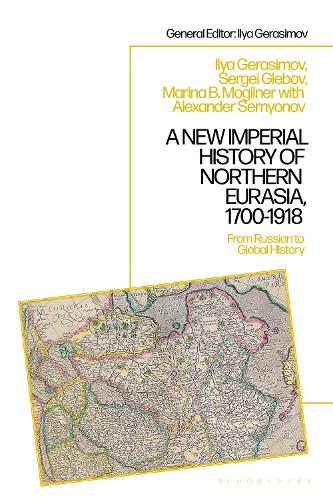
A New Imperial History of Northern Eurasia, 1700-1918: From Russian to Global History
(Hardback)
Publishing Details
A New Imperial History of Northern Eurasia, 1700-1918: From Russian to Global History
By (Author) Marina B. Mogilner
By (author) Professor Alexander Semyonov
By (author) Dr Ilya V. Gerasimov
By (author) Associate Professor Sergey Glebov
Bloomsbury Publishing PLC
Bloomsbury Academic
20th February 2025
United Kingdom
Classifications
Tertiary Education
Non Fiction
947.06
Physical Properties
Hardback
504
Width 164mm, Height 236mm, Spine 34mm
900g
Description
A New Imperial History of Northern Eurasia, 1700-1918 proposes a new language for studying and conceptualizing the spaces, societies, and institutions that existed on the territory of todays Northern Eurasia, until recently part of the USSR. Traditional concepts and genealogies that frame human experience have to be avoided or reframed: this is not the story of a certain present-day state or people evolving through consecutive historical stages. Rather, the books point of departure is a modern analytical approach to the problem of human diversity as a fundamental social condition. In the form of cooperation and confrontation, various attempts to manage diversity fostered processes of societal self-organization, as new ideas, practices, and institutions were developed virtually from scratch or radically altered when borrowed. Essentially, this is the story of individuals and societies who creatively responded to their natural and social environments and sought answers to universal problems in unique historical circumstances. This volume, which brings together leading scholars from both the United States and Russia, covers the period during which the enormous landmass from the Carpathian Mountains in the west to the Pacific Ocean in the east, from the Polar Circle in the north to the steppe belt in the south was put under the control of a single polity: the Russian Empire. Previously, the competing local scenarios of self-organization had taken specific political forms that suited them best. This book shows that the Russian Empire faced the daunting task of coordinating multifaceted diversity within a single political and legal body, under constantly changing domestic and international circumstances. The study reveals that, to this end, the imperial regime employed various means, from violence to science, from segregation to integration, and yet was still unable to block multiple political actors within the empire from advancing their own strategies of belonging, resistance, and participation.
Author Bio
Marina B. Mogilner is Edward and Marianna Thaden Chair in Russian and East European Intellectual History and Associate Professor of History at the University of Illinois at Chicago, USA. She is the author of Homo Imperii: A History of Physical Anthropology in Russia (2013).
